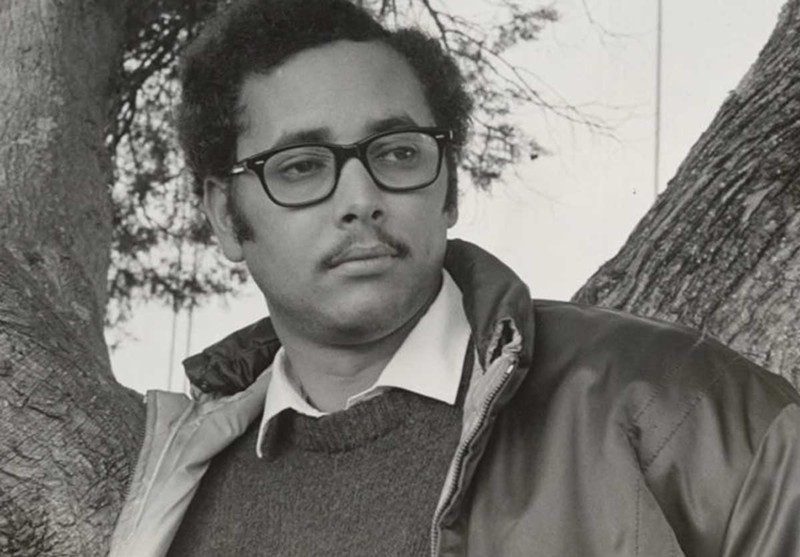https://www.nps.gov/poch/learn/historyculture/dr-robert-l-allen.htm
Port Chicago Naval Magazine
National Memorial California
Dr. Robert L. Allen (1942-2024)
Dr. Robert L. Allen, speaking at the 2013 Port Chicago Commemoration. NPS Photo/L Bailey
Dr. Robert L. Allen: A Life of Scholarship and Activism in Pursuit of Justice
Dr. Robert L. Allen, a distinguished scholar, historian, and civil rights activist, passed away on July 10, 2024. His life's work, encapsulated in his seminal book "The Port Chicago Mutiny," illuminated the injustices faced by African American sailors during World War II and underscored his unwavering commitment to social justice.
Born in Atlanta, Georgia, on May 29, 1942, at Harris Memorial Hospital on Hunter Street, Allen's early life experiences with racial and economic inequalities profoundly shaped his worldview. His parents' community activism instilled in him the values of education, hard work, and justice. He attended E. R. Carter Elementary School and Booker T. Washington High School, both in Atlanta, which further solidified his commitment to social justice and community service.
Allen's academic journey began at Morehouse College, where he earned a Bachelor of Arts in 1963 and was a member of Alpha Phi Alpha fraternity. During his time at Morehouse, he spent an undergraduate year studying in Vienna, Austria, as a Merrill Scholar. He continued his education with graduate work at Columbia University and the New School for Social Research in New York City, eventually completing his Ph.D. in Sociology at the University of California, Berkeley. His doctoral research on racial dynamics within labor movements set the stage for his future scholarly endeavors.
In 1989, Dr. Allen published "The Port Chicago Mutiny," a meticulously researched account of the 1944 explosion at the Port Chicago Naval Magazine in California, which killed 320 men, most of them African American. The subsequent strike by surviving African American sailors, protesting unsafe and segregated working conditions, and the Navy's harsh response highlighted the racial discrimination entrenched in the military and society. Allen's work brought this forgotten chapter of history into public consciousness, advocating for recognition and justice for the Port Chicago 50.
Beyond "The Port Chicago Mutiny," Dr. Allen authored several influential works, including "Black Awakening in Capitalist America," "Reluctant Reformers: Racism and Social Reform Movements in the United States," and "Brotherman: The Odyssey of Black Men in America," co-authored with Herb Boyd. His scholarship consistently focused on uncovering the systemic roots of oppression and offering critical insights into the interconnected struggles of marginalized communities.
The Port Chicago Mutiny by Dr. Robert L. Allen. Source image.
The Port Chicago Mutiny: The Story of the Largest Mass Mutiny Trial in U.S. Naval History (Heyday Books, 1989, republished 2006):
Legacy of Excellence in Academia and Activism
As a professor at the University of California, Berkeley, Allen was known for his dynamic teaching style and ability to connect historical events to contemporary issues. His courses on African American history, social movements, and labor studies inspired countless students. His advocacy work extended beyond academia to community centers, schools, and prisons, where he empowered disenfranchised individuals and communities.
Dr. Allen's contributions to literature and scholarship were recognized with numerous awards and honors. His accolades reflect his profound impact on the fields of history, sociology, and African American studies.
Despite his many achievements, Dr. Allen remained deeply committed to the ongoing struggle for justice. He continued to write, lecture, and participate in activism, driven by the belief that the lessons of the past are crucial for building a more equitable future. His legacy as a scholar and activist serves as a powerful reminder of the enduring fight against racism and the importance of preserving the stories of those who have bravely confronted it.
Dr. Robert L. Allen's passing is a significant loss to the academic and civil rights communities. His life's work exemplifies the power of scholarship to effect social change, and his legacy will undoubtedly inspire future generations to continue the work he so passionately championed.
Additional Influential Works by Dr. Robert L. Allen:
Dr. Robert L. Allen, a prominent scholar and civil rights activist, authored several influential works that focus on racial equality, social justice, and labor history. His notable publications include:
"Black Awakening in Capitalist America: An Analytic History" (1969):

This book examines the rise of Black Power movements and the economic conditions that fueled them, offering critical insights into the intersections of race and capitalism. Published by Doubleday in 1969, it has been described as seminal in the field of Internal Colonialism Theory and remains a significant work in understanding Black liberation movements of the 1960s.
"Reluctant Reformers: Racism and Social Reform Movements in the United States" (1974):
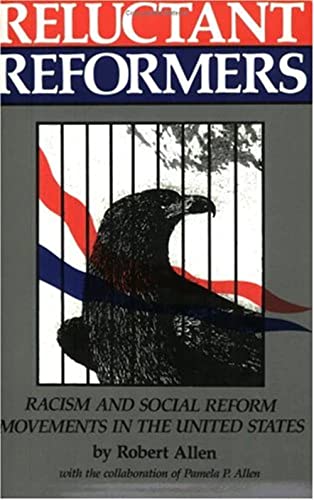
This work analyzes the history of social reform movements in the U.S. and their often ambivalent relationship with issues of racial justice. It is a critical exploration of how these movements have interacted with and been influenced by racial dynamics.
"Brotherman: The Odyssey of Black Men in America" (1996):
Co-authored with Herb Boyd, this anthology presents a collection of essays and stories exploring the experiences and challenges faced by African American men throughout history. The book delves into various aspects of the Black male experience in America, providing a multifaceted view of their struggles and achievements.
"Strong in the Struggle: My Life as a Black Labor Activist" (2001):
This autobiography of Lee Brown, co-written by Allen, details the life of a Black labor activist and his contributions to the labor movement. It highlights the personal and political battles fought by Brown in his quest for labor rights and racial justice.
"The Brotherhood of Sleeping Car Porters: C.L. Dellums and the Fight for Fair Treatment and Civil Rights":
This book delves into the history of the Brotherhood of Sleeping Car Porters, focusing on the significant role of C.L. Dellums in the fight for civil rights and labor equality. It is a detailed account of the challenges and triumphs faced by this pioneering labor union.
Dr. Allen also served as Senior Editor and writer for The Black Scholar journal and co-founded the small press Wild Trees Press with Alice Walker. His extensive body of work, including numerous articles and essays, has had a lasting impact on the fields of African American studies and social justice advocacy.
https://www.heydaybooks.com/catalog/the-port-chicago-mutiny/
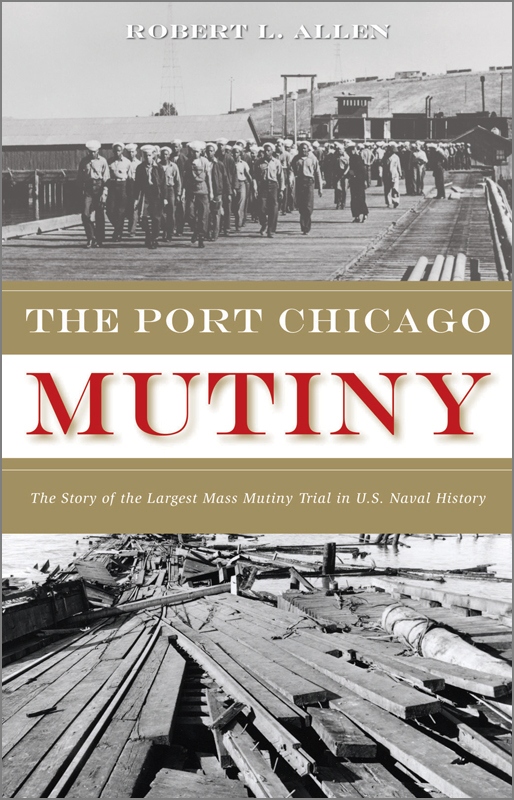
by
During World War II, Port Chicago was a segregated naval munitions base on the outer shores of San Francisco Bay. Black seamen were required to load ammunition onto ships bound for the South Pacific under the watch of their white officers—an incredibly dangerous and physically challenging task.
On July 17, 1944, an explosion rocked the base, killing 320 men—202 of whom were black ammunition loaders. In the ensuing weeks, white officers were given leave time and commended for heroic efforts, whereas 328 of the surviving black enlistees were sent to load ammunition on another ship. When they refused, fifty men were singled out and charged—and convicted—of mutiny. It was the largest mutiny trial in U.S. naval history. First published in 1989, The Port Chicago Mutiny is a thorough and riveting work of civil rights literature, and with a new preface and epilogue by the author emphasize the event’s relevance today.
Published in collaboration with the Equal Justice Society.
Port Chicago Commemoration – Release of Robert L. Allen Oral History
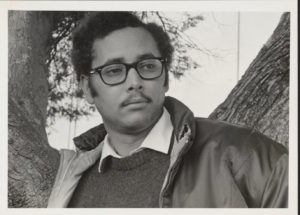
In many respects, the life of Robert Allen proves as extraordinary as the many African American men and women whose stories he brought to light through nearly fifty years of writing and scholarship. Born in 1942, Allen grew up in segregated Atlanta where he experienced firsthand the harsh realities of racism, the complicated divisions which ran through the Black community, and the bridges of solidarity that ultimately helped forge the Civil Rights Movement. A graduate of Morehouse College, he moved to New York City in the early 1960s where he abandoned an internship with IBM for a reporting job with the National Guardian. As the publication’s first Black journalist, Allen became a leading voice in documenting the African American experience in the City and the growing intersection between the Civil Rights and Anti-War Movements. In 1967, that intersection became personal as Allen formally refused his draft notice and formed the anti-draft group African Americans for Survival. That same year, his work with the National Guardian allowed him the rare opportunity to explore that same intersection on the international level, attending the International Peace Conference in Czechoslovakia, as well as a multi-week tour of both North and South Vietnam. In 1968, Allen moved to the Bay Area of California to head up the publication’s San Francisco office. It was a region the native Atlantan would come to call home.
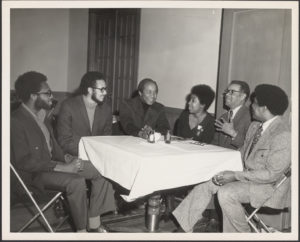
The Bay Area not only once again gave Allen a front row seat to national change, it also proved a fertile ground for his growing intellectual interests and curiosity. He had earned a master’s degree in sociology from The New School during his time in New York City, and continued his studies in California with a doctorate from UC San Francisco. In 1975, he began serving as senior editor for The Black Scholar, a position he would hold for the next thirty-seven years. During Allen’s tenure, The Black Scholar became one of the most influential journals of Black Studies in the country, tackling the most pressing issues of the African American community through both its journal and book series. At the same time, his scholarly career began to take footing in the more traditional academic environments, holding positions at San Jose State, Mills College, and UC Berkeley, where he taught in the African American and Ethnic Studies Departments from 1993 to 2012.
The author and editor of many books on the African American experience, Allen is best known for his 1989 book, The Port Chicago Mutiny, which recounted the untold story of the military explosion that cost the lives of 320 African American men and led to the largest mutiny trial in military history. As Allen discusses in his oral history, he stumbled onto the story by accident in other research during the 1970s, not knowing at all what he had discovered or the impact the story would ultimately have. Shortly after publication, his research and work on the Port Chicago Explosion had earned him a Resolution of Commendation from the California State Assembly, as well as a Northern California Emmy Award for the television documentary—rare honors for an academic and writer. And over the years, the impact of the story continued to grow. By 1994, a memorial was formally established at the site, and in 2009, with the signature of President Barack Obama, the Port Chicago Naval Magazine National Memorial was officially created.
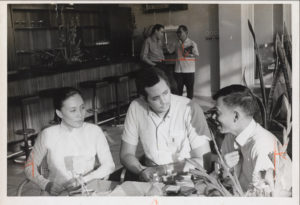
In collaboration with our partner and sponsor, the National Park Service, the Oral History Center is pleased to release Robert Allen: From Segregated Atlanta to UC Berkeley, A Life of Activism and African American Scholarship, as well Allen’s digitized oral histories with Port Chicago survivors, Moreover, the OHC is proud to join the National Park Service in commemorating the 76th Anniversary of the Port Chicago Explosion.
Additional Robert L. Allen collections:
Sources:
US Naval Institute (U.S. Naval Institute)
Port Chicago Alliance (Port Chicago Alliance)
UC Berkeley Library Update (UC Berkeley Library Update - Update)
RIP Robert L. Allen, a Black scholar in every sense of the words
The author is best known for his 1989 book The Port Chicago Mutiny, about a 1944 incident which saw 256 Black sailors unjustly court-martialed and who were recently exonerated
by Herb Boyd
July 19, 2024
Detroit Metro Times
News that the U.S. Navy had exonerated 256 Black sailors who were unjustly court-martialed in 1944 following the Port Chicago explosion in California was all the alert I needed to contact my friend and co-editor, Robert Allen. I wanted to chat with him about the news since it was his 1989 book The Port Chicago Mutiny that enlightened me about the incident. I was curious if the news reports would mention his account and ask him for a quote. It was merely by chance that in seeking that information I learned Robert had died on July 10, a week before the sailors were exonerated. One piece of good news led me to some bad news. He was 82.
Long before our lives intersected, I knew of him through his activist journalism in his richly informative book Black Awakening in Capitalist America (1969), and his articles in the National Guardian, a radical newsweekly. When I began submitting articles to the Black Scholar journal, where he was among the founding editors, our relationship blossomed. Nearly a generation went by before we began our collaboration on the anthology Brotherman: The Odyssey of Black Men in America (1995). A shared division of labor on the project brought us closer together and I learned what a skilled editor he was and how self-effacing he could be. It was also during a time when his relationship with Alice Walker was coming to an end.
Robert was born on May 29, 1942, in Atlanta, Georgia, at Harris Memorial Hospital on Hunter Street. His parents were community activists and it wasn’t long before he too was involved in social and political fights for equal justice. He attended the E.R. Carter Elementary School and Booker T. Washington High School, both in Atlanta. His academic journey continued at Morehouse College, where he earned a Bachelor of Arts in 1963 and was a member of the Alpha Phi Alpha fraternity. He spent an undergraduate year studying in Vienna, Austria, as a Merrill Scholar. In New York City he did graduate work at Columbia University and the New School for Social Research.
He completed his Ph.D. in sociology at the University of California, San Francisco. His doctoral research on racial dynamics within labor movements led him to broader scholarly endeavors, including civil and human rights. Black Awakening in Capitalist America was the culmination of his study and participation in various political formations, particularly those involved in the anti-war movement.
Robert’s book on Black militants and their organizations was widely reviewed and required reading and accompanied the rise of Black Studies.
“The fact of black America as a semi-colony, or what has been termed domestic colonialism, lies at the heart of this study,” he wrote in the book’s introduction. “It is at one and the same time the most profound conclusion to be drawn from a survey of the black experience in America, and also the basic premise upon which an interpretation of black history can be constructed.”
When he wasn’t on the ramparts or chasing behind activists, charting their movements and struggles, he was in the classroom and he taught at several colleges, including the San Jose State University and Mills College in Oakland. In 1963, he married Pam Allen, and they collaborated on The Reluctant Reformers: The Impact of Racism on Social Movement in the U.S. (1983). During his companionship with Alice Walker, they founded Wild Trees Press, publishing As Wonderful As All That, the memoir of Henry Crowder’s affair with Nancy Cunard; he the gifted Black pianist, she the white shipping line heiress.
His legacy of excellence in academia and activism was often highlighted in the classroom at the University of California, Berkeley. And I was often privy to some of his lectures as we worked on Brotherman. He was more than a worthy constituent, but a soul brother in every way and he will be missed by a community of scholars and activists nurtured by his extensive and passionate research. It’s a shame that he didn’t live to see the Black sailors exonerated, but there is every indication in his study of the incident that he knew one day the men would have their day in the court on high.
You can read more about the Port Chicago Explosion and Robert L. Allen at the University of California, Berkeley website.



